Publishing Talks: David Wilk interviews Jason Allen Ashlock
May 31, 2010 by David
Filed under PublishingTalks, The Future
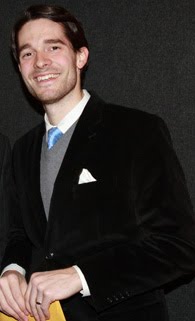 In this series of interviews, called Publishing Talks, I have been talking to book industry professionals about the future of publishing, books, and culture. This is a period of disruption and change for all media businesses. How will publishing evolve as our culture is affected by technology, climate change, population density, and the ebb and flow of civilization and its economics? Publishing Talks interviews help us understand the outlines of what is happening, and how we might ourselves interact with and influence the future of publishing as it unfolds.
In this series of interviews, called Publishing Talks, I have been talking to book industry professionals about the future of publishing, books, and culture. This is a period of disruption and change for all media businesses. How will publishing evolve as our culture is affected by technology, climate change, population density, and the ebb and flow of civilization and its economics? Publishing Talks interviews help us understand the outlines of what is happening, and how we might ourselves interact with and influence the future of publishing as it unfolds.
These interviews give people in the book business a chance to talk openly about ideas and concerns that are often only talked about “around the water cooler,” at industry conventions and events, and in emails between friends and they give people inside and outside the book industry a chance to hear first hand some of the most interesting and challenging thoughts, ideas and concepts being discussed by people in the book business.
I first read about the new literary agency, Movable Type Literary Group established by Jason Ashlock and his partner Meredith Dawson a few months ago. I’ve wondered for awhile now about the role of agents in the changing landscape of book publishing, and evidently so have Jason and Meredith. Along with an NEA based graph on their home page “Books are not dead,” they have composed the following statement of purpose and occasion:
“We have arrived, as Harold Bloom might say, belatedly.
The scene is established, the paradigms rigid, the machine stubborn and aging. Now more than half a millennium removed from the prima typographicae incunabula, “the first infancy of printing,” a chorus now announces the swift and coming death of the published word and the end of book history. But crisis and opportunity are concurrent, and the instability of one paradigm leads to the creation of another. We work in publishing at a moment of both belatedness and birth, when the trend of all future events is being determined. We aim, with many of our friends and colleagues, to confront the crisis of the moment and from the upheaval to design and shape a future.”
When I ran across Jason at a publishing event in Manhattan, we arranged to talk. I wanted to hear in his own words what this new agency will be all about. I think alot of what he says here will resonate for listeners of this podcast. Certainly, it makes sense for the role of the agent to be transformed, and to help lead the transformation of relationships between author, publisher and audience that is emerging now. It looks like Movable Type has an opportunity to create a new model for its own clients, and by example, for others as well. Maybe because, like many others looking at an established industry with new eyes, Jason Ashlock has an opportunity to create a new paradigm.
Podcast: Play in new window | Download
Alice Lichtenstein: Lost: A Novel
May 24, 2010 by David
Filed under Fiction, WritersCast
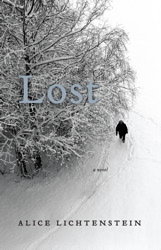 978-1439159828 – Scribner – Hardcover – $24.00 (also available as an e-book)
978-1439159828 – Scribner – Hardcover – $24.00 (also available as an e-book)
Some books are painful but must be read; the suffering of the characters we identify , endured, the story absorbed into one’s bones. I found that to be the case with Lost: A Novel by Alice Lichtenstein. This story operates on a number of levels, as a good novel should. Its three main characters are “lost” but each in different ways. And unlike the television show of the same name (I wonder how that congruency affects the potential readership of this novel?), the core of the story is not hidden away from us, the literal losses in this novel are by far not the deepest pain the characters endure, nor we the readers with them.
But don’t get wrong, this is not a novel so full of pain that it drives you away, or causes you to wonder why you are there. It’s not a book that is simply devoted to misery, and certainly not the kind of suffering that drives us away from the book or its characters. I was immediately drawn into the story, attracted to the characters, especially Susan, whose husband suffers from acute dementia, and has walked away into the winter, and Christopher, whose wife has left him. Their losses and their relationship is at the heart of the novel, and will ultimately unite them in redemption. I really liked the carefully woven web which connects the three key characters and the various subplots that eventually lead into the fullness of the novel.
And this is definitely a novel of winter in a cold country, which ironically provides much of the heat of the story. The coldness in the book is palpable – the author does live in and deeply feels the north country; she describes the cold like a native.
As much as I enjoyed the novel, I also very much enjoyed talking to the author, Alice Lichtenstein. In our conversation, we explored the complexity of the novel and her characters’ desires, their connections and the meaning of their losses. This is a book I recommend to friends, and an author whom I think has alot to say about human life and emotion, and importantly, who writes really well. Plus she is a good conversationalist. It’s not that easy a combination to find. 
Podcast: Play in new window | Download
Publishing Talks: David Wilk interviews Eoin Purcell
May 21, 2010 by David
Filed under Ebooks and Digital Publishing, PublishingTalks, Technology, The Future
 In this series of interviews, called Publishing Talks, I have been talking to book industry professionals about the future of publishing, books, and culture. This is a period of disruption and change for all media businesses. How will publishing evolve as our culture is affected by technology, climate change, population density, and the ebb and flow of civilization and its economics? Publishing Talks interviews help us understand the outlines of what is happening, and how we might ourselves interact with and influence the future of publishing as it unfolds.
In this series of interviews, called Publishing Talks, I have been talking to book industry professionals about the future of publishing, books, and culture. This is a period of disruption and change for all media businesses. How will publishing evolve as our culture is affected by technology, climate change, population density, and the ebb and flow of civilization and its economics? Publishing Talks interviews help us understand the outlines of what is happening, and how we might ourselves interact with and influence the future of publishing as it unfolds.
These interviews give people in the book business a chance to talk openly about ideas and concerns that are often only talked about “around the water cooler,” at industry conventions and events, and in emails between friends. I believe these interviews give people inside and outside the book industry a chance to hear first hand some of the most interesting and challenging thoughts, ideas and concepts being discussed within the industry.
Eoin Purcell works and lives in Dublin, Ireland. He is a publishing industry analyst and commentator. He runs Green Lamp Media, a publishing and publishing services company and also edits Irish Publishing News.
He has worked as Commissioning Editor with one of Ireland’s oldest independent publishers Mercier Press and at Nonsuch Ireland (now The History Press Ireland). He writes occasional blog posts and columns on the Irish book trade for The Bookseller magazine.
I was prompted to talk to Eoin by his persuasive and cogent article that appeared in (Ed Nawotka’s highly recommended online newsletter) Publishing Perspectives called “E-Books are a Cul-de-sac: Why Publishing Needs to Rethink its Digital Strategy.” In my view, Eoin consistently thinks and writes clearly about the unfolding future of a digital publishing future. In this conversation we talked mainly about how publishers (and authors) can and must adapt to the emerging environment created by new technology (and new distribution models), including practical ideas and actions they can take to embrace new tools and methods of reaching readers in a profitable way. He expressed his view that publishers need to focus on longer term trends, the values they can provide to readers (and writers) and then build their businesses around identifiable communities of readers. We also talked about the differences in marketing paradigms that digital publishing establishes for publishers, the idea of “publishing as community” and much more.
Eoin provides a fresh, incisive perspective along with realistic ideas and strategies for publishers who want to embrace a new paradigm of publishing based on a web-centric environment. I think this conversation will be valuable to anyone (publisher or author) who is interested in creating a successful digital strategy for the long term future.
Podcast: Play in new window | Download
Aharon Appelfeld: Blooms of Darkness
May 15, 2010 by David
Filed under Fiction, WritersCast
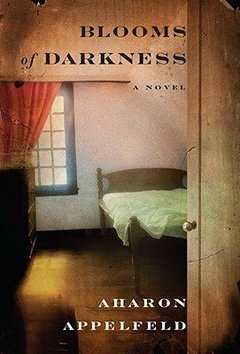 978-0805242805 – Shocken Books – Hardcover – $25.95
978-0805242805 – Shocken Books – Hardcover – $25.95
Aharon Appelfeld’s Blooms of Darkness is a powerful, majestic and triumphant coming of age novel. It’s told entirely in the first person, in sentences that are short, sharp, clear and beautifully composed. And since we know that it was written originally in Hebrew, the translator, Jeffrey M. Green, deserves special mention for the excellent English version we have here.
The book takes place in an unnamed city in Ukraine from 1943 to the end of the war, not even three years. The narrator and central character is Hugo, 11 years old at the outset of the novel, taken by his mother to stay with her closest friend Mariana, who turns out to be a prostitute living in a brothel. Much of the novel, therefore, takes place in the closet and room they share, under constant threat of exposure and death. The sense of living in a highly charged atmosphere, in such an internal space, is almost palpably claustrophobic, and inhabits every element of the story. The relationship between Hugo and Mariana is the core of the novel; they each suffer, they depend entirely upon each other. Their relationship grows and deepens through the course of the novel and its experience becomes a powerful transformative force for Hugo, who, like the author, survives the war as a completely different person than he was when his story begins.
Aharon Appelfeld has lived in Jerusalem for more than sixty years. He speaks many languages, but now writes only in Hebrew, which he learned only as an adult. We talked in depth about the events and characters in this beautiful novel, the nature of fiction as opposed to memoir, and about the author’s life as a Holocaust survivor and Jewish writer and teacher. Blooms of Darkness is a novel that has stayed with me since I read it; its story is one of hope and survival, as is the life of its author. This novel was transformative for me, as was my discussion with its brilliant author.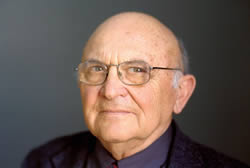
Podcast: Play in new window | Download
Publishing Talks: David Wilk interviews Jason Epstein
May 10, 2010 by David
Filed under Publishing History, PublishingTalks, Technology, The Future
 In this series of interviews, called Publishing Talks, I have been talking to book industry professionals about the future of publishing, books, and culture. This is a period of disruption and change for all media businesses.
In this series of interviews, called Publishing Talks, I have been talking to book industry professionals about the future of publishing, books, and culture. This is a period of disruption and change for all media businesses.
How will publishing evolve as our culture is affected by technology, climate change, population density, and the ebb and flow of civilization and its economics? Publishing Talks interviews help us understand the outlines of what is happening, and how we might ourselves interact with and influence the future of publishing as it unfolds.
These interviews give people in the book business a chance to talk openly about ideas and concerns that are often only talked about “around the water cooler,” at industry conventions and events, and in emails between friends. I believe these interviews give people inside and outside the book industry a chance to hear first hand some of the most interesting and challenging thoughts, ideas and concepts being discussed within the industry.
Jason Epstein has led one of the most creative careers in book publishing of the past half century. In 1952, while a young editor at Doubleday, he created Anchor Books, which launched the so-called ‘paperback revolution’ and established the trade paperback format. In the following decade he became cofounder of The New York Review of Books. In the 1980s he created the Library of America, the prestigious publisher of American classics, and The Reader’s Catalog, the precursor of online bookselling. For many years, Jason Epstein was editorial director of Random House. He is the recipient of many awards, including the Curtis Benjamin Award of the American Association of Publishers for inventing new kinds of publishing, the Lifetime Achievement Award of the National Book Critics Circle for creative publishing, and the National Book Award for distinguished contribution to American Letters. As an editor, he worked with many well-known novelists, including Norman Mailer, Vladimir Nabokov, E. L. Doctorow, Philip Roth, and Gore Vidal, and important non-fiction writers as well.
Most recently he has spearheaded the creation of the Espresso Book Machine as co-founder of On Demand Books, and is the author of Book Business: Publishing Past, Present, and Future and numerous articles and essays.
For me it was a great honor and pleasure to talk to Mr. Epstein at his kitchen table, first about his incredible career in publishing, then about his current work with on-demand publishing, and of course, his many ideas about the future of books and publishing, all of which deserve the close attention of all of us who are trying to figure out where books, publishing and literary culture is headed. His vision of the evolving future of the nature of publishing and the value of traditional editorial skillsets will be of particular interest to many listeners.
Podcast: Play in new window | Download
David Lehman: A Fine Romance: Jewish Songwriters, American Songs
May 6, 2010 by David
Filed under Non-Fiction, WritersCast
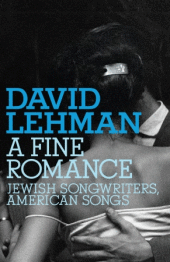 978-0805242508 – Shocken Books – Hardcover – $23.00 (also available in e-book format)
978-0805242508 – Shocken Books – Hardcover – $23.00 (also available in e-book format)
What a lovely book this is. David Lehman is an acclaimed anthologist and a poet (his most recent book of poems is Yeshiva Boys), and David’s approach to the great American songbook of the 20th century is complex and personal, written from an interior place, while at the same time, erudite and celebratory of the full glory of the words and music he writes about. Lehman brilliantly evokes the individual lyricists and composers who made this music, so many of whom were the first generation children of immigrants from eastern European countries and were somehow able to meld their art with the true soul of America. They created music that both evoked their era, and simultaneously defined it.
Lehman explores the rich complexity of American music in the early to mid-Twentieth Century, as the musical soul of Jewish songwriters melded itself to the African-American jazz and blues tradition to make something new and unique. All the greats are here, Berlin, both Gershwins, Rogers, Hart, Hammerstein, and many more. He tells the stories behind the songs, and brings to life the composers and lyricists who wrote them.
For David Lehman, this music is touchstone to his being, and that deeply felt connection shines through his words. Reading this book allows one then to connect to the author, also in a deeply felt way. Lehman is a fine writer, in full command of his subject. I liked what John Ashbery said about David: “David Lehman’s A Fine Romance wittily explores the enormous contribution of Jewish writers and composers to the American musical scene. Lehman finds Jewish influence, or what he calls ‘a plaintive undertow,’ even in such unlikely upbeat anthems as Gershwin’s ‘Love Walked In.’ His love-struck history is itself a major entertainment.”
Talking to this author about the stories and music, and especially the songwriters themselves was for me a natural extension of reading the book, and inhabiting the author’s personal life through its pages. We covered alot of ground, including much about the unusual, impressionistic style and structure of the book, and of course the music, the songwriters, his many anecdotes and stories, and David Lehman’s obvious love of his subject. I hope you will enjoy listening to it as much as I enjoyed the conversation with the author.
Podcast: Play in new window | Download
Publishing Talks: David Wilk Interviews Lena Tabori
May 2, 2010 by David
Filed under Publishing History, PublishingTalks
 In this series of interviews, called Publishing Talks, I have been talking to book industry professionals about the future of publishing, books, and culture. This is a period of disruption and change for all media businesses.
How will publishing evolve as our culture is affected by technology, climate change, population density, and the ebb and flow of civilization and its economics? Publishing Talks interviews help us understand the outlines of what is happening, and how we might ourselves interact with and influence the future of publishing as it unfolds.
In this series of interviews, called Publishing Talks, I have been talking to book industry professionals about the future of publishing, books, and culture. This is a period of disruption and change for all media businesses.
How will publishing evolve as our culture is affected by technology, climate change, population density, and the ebb and flow of civilization and its economics? Publishing Talks interviews help us understand the outlines of what is happening, and how we might ourselves interact with and influence the future of publishing as it unfolds.
These interviews give people in the book business a chance to talk openly about ideas and concerns that are often only talked about “around the water cooler,” at industry conventions and events, and in emails between friends. I believe these interviews give people inside and outside the book industry a chance to hear first hand some of the most interesting and challenging thoughts, ideas and concepts being discussed within the industry.
Lena is the founder of Welcome Enterprises and is currently Welcome’s director and publisher of Welcome Books, the imprint under which the company publishes illustrated books. In addition to overseeing the development, production, operation, and promotion of Welcome’s publishing program, Lena continues to conceive, edit, and produce book projects, as she has done throughout her long career as a publishing professional.
She began her career in 1967 with Harry N. Abrams, where she rose to the position of vice president of Marketing and Special Sales. In 1980, Lena left Abrams to create Welcome Enterprises as well as to co-found Stewart, Tabori & Chang, the illustrated book publisher. Lena also found time to produce Ziggy’s Gift, an animated special for ABC television based on the Tom Wilson cartoon character and directed by Richard Williams. For her role as producer and executive producer of Ziggy’s Gift, she was awarded an Emmy in 1983.
In 1991, Lena moved to San Francisco to become president and publisher of CollinsPublishersSanFrancisco. In 1993, she returned to Stewart, Tabori & Chang as their president and publisher. In 1997, Lena returned to Welcome full-time.
Most noted for her work in illustrated books and highly original publishing projects Lena Tabori is one of the most successful figures in contemporary American publishing. In this interview, Lena talked to me mostly about the earliest stages of her long and very successful career. During that time she has never stopped innovating, being highly creative, and producing both artistically and commercially successful books, working with many great writers and artists, as well as talented people in publishing. She has published, conceived, created, or caused to exist an incredible number of exceptional books in many categories, shapes and sizes. Anyone interested in modern publishing and the principles that will endure during its current period of disruption will find this discussion interesting and valuable.
Podcast: Play in new window | Download
Anya Kamenetz: DIY U: Edupunks, Edupreneurs, and the Coming Transformation of Higher Education
April 29, 2010 by David
Filed under Non-Fiction, WritersCast
 978-1603582346 – Chelsea Green Publishing – paperback – $14.95 (also available in e-book formats)
978-1603582346 – Chelsea Green Publishing – paperback – $14.95 (also available in e-book formats)
In some ways the title of this book is a bit misleading, as there is no reference to a major part of the book – an extensive discussion at the beginning of DIY U that is a history and analysis of American higher education. It’s an important discussion for millions of Americans who question how the system got to where it is, and how it could be made to change. I think of myself as pretty knowledgeable about how things work but I was completely surprised at some of the things I learned about modern higher education in this part of the book. I’m willing to say that it’s a must-read for anyone interested in public policy and the future of our society (hopefully that’s alot of people). We need to question every aspect of how we educate our citizenry.
Which leads us to the next part of the book, which is really what the title refers to. Whereas the entrenched systems appear to be immoveable, there is so much ferment and change afoot, so much that is enabled by the web and the networked, decentralized, open source nature of emerging, modern culture, that there really is hope for the meaningful and significant change we need. As Chelsea Green says about DIY U on their website: “The future lies in personal learning networks and paths, learning that blends experiential and digital approaches, and free and open-source educational models. Increasingly, you will decide what, when, where, and with whom you want to learn, and you will learn by doing. The university is the cathedral of modernity and rationality, and with our whole civilization in crisis, we are poised on the brink of a new Reformation.”
I loved talking to Anya Kamenetz and wish we had more time to talk – not just about her book and the work she did to write it, but her incisive ideas and her many interests in modern, connected culture. We had a great conversation talking about her book and so many of her ideas. She’s incredibly intelligent, has complete command of her subject and is a terrific writer – her extensive experience as a journalist serves her well both in conversation and in the longer form of a full length book. She can work with big swatches of information and ideas and make them clear and understandable, and importantly, never bores her readers. Hopefully I’m not alone in wanting see this book help us envision and then implement significant change in education, learning and social change. This is a book that can make a real difference.
Anya Kamenetz is a staff writer for Fast Company magazine. The Village Voice nominated her for a Pulitzer Prize for contributions to the feature series Generation Debt, which became a book in 2006. She has written for the New York Times, appeared on CNN and National Public Radio, and been featured as a “Yahoo Finance Expert.” A frequent speaker nationwide, Anya blogs at Fastcompany.com, The Huffington Post, and anyakamenetz.blogspot.com. She lives in Brooklyn with her husband.
Podcast: Play in new window | Download
Publishing Talks: David Wilk Interviews Margo Baldwin
April 25, 2010 by David
Filed under Ebooks and Digital Publishing, Publishing History, PublishingTalks, The Future
 In this series of interviews, called Publishing Talks, I have been talking to book industry professionals about the future of publishing, books, and culture. This is a period of disruption and change for all media businesses.
In this series of interviews, called Publishing Talks, I have been talking to book industry professionals about the future of publishing, books, and culture. This is a period of disruption and change for all media businesses.
How will publishing evolve as our culture is affected by technology, climate change, population density, and the ebb and flow of civilization and its economics? Publishing Talks interviews help us understand the outlines of what is happening, and how we might ourselves interact with and influence the future of publishing as it unfolds.
These interviews give people in the book business a chance to talk openly about ideas and concerns that are often only talked about “around the water cooler,” at industry conventions and events, and in emails between friends. I believe these interviews give people inside and outside the book industry a chance to hear first hand some of the most interesting and challenging thoughts, ideas and concepts being discussed within the industry.
Margo Baldwin is the co-founder of Chelsea Green Press, an outstanding and fiercely independent publisher now based in White River Junction, Vermont. We’ve known each other a long time, and over the years, we’ve had opportunities to talk about publishing and politics on many different levels, so this interview is really a continuation of that ongoing conversation about books and ideas, and the role independent publishing can play in making real social change. Chelsea Green’s work extends far beyond the books it publishes, to blogs, websites, video, political movements, and community involvement. The company’s 2003 mission statement is a powerful – and sobering – expression of what a socially engaged publisher might be in the 21st century.
“Indeed, one begins to wonder what “living” really means or will come to mean in the opening decade of the twenty-first century. Can anything be deemed sustainable when life itself–in all its myriad forms–is threatened at so many levels? Is it enough to focus on the how-to of ‘green living’ in the face of such overwhelming force, the ‘shock and awe’ of forest and ecosystem destruction, the rampant plundering of the world’s oceans, the terror of GMO-contaminated-food, and the unintended consequences of biotechnology? We wish to move the company forward boldly and with a new sense of urgency. While continuing our commitment to remain at the forefront of information about green building, organic growing, and renewable energy – the practical aspects of sustainability – we will also publish for a new politics of sustainability, for the cultural resistance that living demands of us now.”
In our Publishing Talks conversation, Margo talks about the history of Chelsea Green, where it is today, and where her vision of publishing will lead the company in the future as it tries to carry out its bold and important mission. The recently announced partnership between Chelsea Green and Vermont’s Northshire Books is a great example of the creative thinking that Margo and her company are practicing.
Podcast: Play in new window | Download
Joanna Smith Rakoff: A Fortunate Age
April 22, 2010 by David
Filed under Fiction, WritersCast
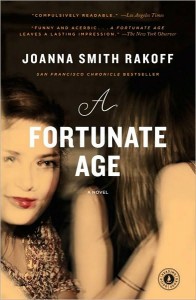 978-1416590804 – Paperback – Scribner – $15.00
978-1416590804 – Paperback – Scribner – $15.00
Joanna Smith Rakoff is a wonderful writer – she’s a poet and an essayist, and her skill as a writer shines throughout her novel A Fortunate Age. This was not a book I expected to enjoy as much as I did; Rakoff won me over with the details of her sprawling story, and her characters, whom I similarly did not expect to like so much. The book is modeled directly on Mary McCarthy’s now classic, The Group, whose characters were Vassar women, in a story set in the 1930s and 1940s, whereas Rakoff’s characters are all friends from Oberlin, living in New York City in the late 1990s and the early years of the new century.
Like the novel Rakoff used for inspiration, this is a complicated story with a number of characters told over a number of years. This novel is set mostly in New York City with flashbacks to her characters’ earlier lives, especially their time in college in Oberlin, and some side stories as well. Essentially, it’s a coming of age story, and based on the supposition, I think, that for so many of us, the decade crossing from our twenties to our early thirties truly marks the painful bridge from still youthful adulthood to “real” life. It’s not an easy transition, and for many has the sense of hyper-focused reality that makes it all the more powerful for those experiencing it.
In talking with Joanna, I wanted to explore her interest in Mary McCarthy and her novel that A Fortunate Age is based on (and The Group is also a book I recommend to modern readers, it is a book that is probably more neglected than it should be). Joanna talks about the striking similarities she felt between the lives of her own age group and that of McCarthy’s and how that led her to write her own book. We also talked about the way her book is imagined and how through fiction she worked to represent a particular time and place, a milieu that she evokes through this story, the breadth of her characters and their individual linked stories. As she points out, this novel is, for her almost Victorian in the way its characters function against and within an overall cultural structure toward understanding their social being. There is alot going on in her book, which Rakoff manages quite masterfully, and her ability to handle complexity of story and persona shines in this interview as well. I’m certainly looking forward to reading her next book and to talking to her again.
Podcast: Play in new window | Download
